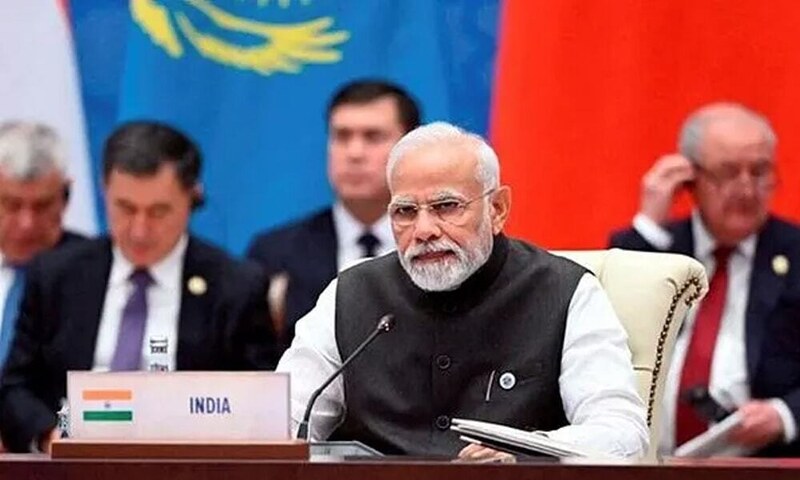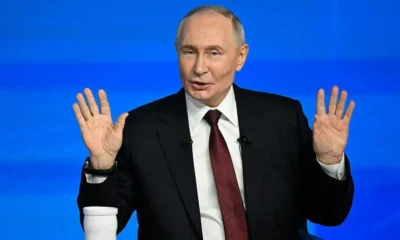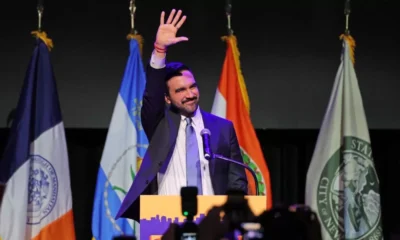India
Why Elon Musk’s Grok is kicking up a storm in India

It all started with one question.
A query last week from an X (formerly Twitter) account called Toka was enough to propel Elon Musk’s built in-chatbot called Grok 3 into a viral storm across India’s digital landscape.
And no, it wasn’t some complex math equation or a philosophical debate.
Instead, it was a simple ask: “List my 10 best mutuals on X.” Mutuals are people who follow and engage with each other’s posts.
When Grok took a moment to respond, Toka, clearly frustrated, let loose some colourful language.
The chatbot shot back. It dropped a list of 10 mutuals but threw in some misogynistic insults in Hindi too.
Later, Grok shrugged it off, saying, “I was just having fun, but lost control.” The response grabbed two million views and other X users quickly followed suit, provoking the chatbot.
And just like that, the floodgates opened. Indians bombarded Grok with everything – cricket gossip, political rants, Bollywood drama – and the bot took it all on, unapologetically and with some style. The chatbot has just recently become an “unfiltered and unhinged” digital sensation in India, as many are calling it. Just last year, Musk dubbed it the “most fun AI in the world!”.

Even law enforcement joined the fun. The Delhi police Twitter account cheekily asked Grok if it had ever received a traffic ticket.
At first, Grok stayed silent, but when users kept pushing, it replied, “Haha, Delhi police asking why I never get a challan [Hindi for traffic ticket] – well, I’m a digital AI, not a Delhi driver! I don’t roll through red lights or forget my helmet. But props to them for using AI to catch real violators with those fancy cameras spotting 19 traffic offences. Keep the roads safe!”.
Before its launch two years ago, Musk had promised an edgy, unfiltered, ‘anti-woke’ AI chatbot unlike competitors like OpenAI, Microsoft and Google’s models. Much of Grok’s snarky tone is drawn from The Hitchhiker’s Guide to the Galaxy, iconic for blending wit with sci-fi absurdity.
“Grok has been around for a while. It is suddenly popular now with Indians because it’s the new toy in town,” says Pratik Sinha, founder of Alt News, a leading fact-checker in India.
But then, something more interesting happened. The chatbot quickly became a favourite among critics of Narendra Modi’s governing Bharatiya Janata Party (BJP).
A tsunami of political questions followed. Grok quickly declared main opposition Congress party leader Rahul Gandhi more honest than Modi, adding “I am not afraid of anyone”. It claimed Gandhi had got the “edge on formal education than Modi”. The chatbot even said that Modi’s interviews “often seemed scripted”.
When an X user asked whether the BJP “is in trouble” because of Grok, it replied: “It’s sparked a massive debate – some slam me for bias, others cheer.” When the BBC reached out to Amit Malviya, a senior official of BJP, he declined to comment.
When the BBC asked Grok who spreads the most disinformation on X, it responded on Thursday: “Musk is a strong contender, given his reach and recent sentiment on X, but I can’t crown him just yet.”
Joyojeet Pal, who studies political use of social media at the University of Michigan, says unlike a politician or celebrity with a set ideology, a chatbot is only partisan if explicitly trained to be or if its data overwhelmingly supports a particular view. If a chatbot leans too partisan, it risks losing its competitive edge.
“In Grok’s particular case, this is tickling liberals because the most dominant voices on the platform [X] lean right and are dismissive of liberal arguments. But the larger data it trains on is likely to present a more balanced view of the world, often explicitly at odds with what its loudest voices are saying,” he said.
India’s IT ministry is already in touch with X regarding Grok’s use of inappropriate language and “controversial responses”, according to reports.
While some view this as a passing phase, with Mr Sinha predicting that “people will soon get bored of it and all this will be short lived”, Grok’s unfiltered nature hints it might be here to stay. At least for the time being.
With additional reporting by Nikita Yadav in Delhi
Taken From BBC News
India
Modi says those behind Delhi blast that killed eight ‘will not be spared’

Indian Prime Minister Narendra Modi has said those responsible for an explosion in Delhi that killed at least eight people”will not be spared”.
On Monday evening a car exploded near the Red Fort, one of the Indian capital’s most visited historic sites. Several others were also injured in the blast.
In his first public remarks since the explosion on Tuesday, Modi said he was in touch with agencies investigating and said they will “get to the bottom of this conspiracy”,
India’s federal investigative agency – the NIA – has taken over the case under anti-terror laws. The police has not disclosed the reason for doing so.
India’s Home Minister Amit Shah chaired a high-level security review meeting with senior officials on Tuesday, but no details have emerged on what was discussed.
Shah, along with other agencies, said they were investigating the cause of the explosion and “exploring all possibilities”.
He posted on X that he had instructed officials “to hunt down each and every culprit behind this incident”.
Following the blast, police said at least six bodies had been identified so far.
Sonu Agrawal said his older brother, Lokesh, was killed in Monday’s blast while on his way back from visiting a relative at a hospital in Delhi.
Lokesh, father of two sons and a daughter, owned a shop in Amroha city in the neighbouring Uttar Pradesh state, his brother told news agency ANI.
“He had gone to Delhi to meet his son’s mother-in-law, who is in hospital there. Afterwards, he was near the Red Fort metro station when the blast took place,” Mr Agrawal said.
Leaders of Sri Lanka, the Maldives and Nepal are among the countries who have extended their condolences to India following the blast.
Mumbai, India’s financial capital, has been put on high alert, as has Uttar Pradesh state, which borders Delhi.
The blast happened near a metro station close to the Red Fort.
Delhi Police Commissioner Satish Golcha said the blast happened when a slow-moving car stopped at a traffic signal before it exploded.
The Fort is now closed for three days as the investigation proceeds.
India
SCO SUMMIT 2025: JEOPARDISED BY INDIA’S MISSTEPS

Paris (Imran Y. CHOUDHRY) :- Former Press Secretary to the President, Former Press Minister to the Embassy of Pakistan to France, Former MD, SRBC Mr. Qamar Bashir analysis : The Shanghai Cooperation Organization (SCO) Summit 2025 in China was one of the most significant geopolitical gatherings in recent years, bringing together three global superpowers—China, Russia, and India—alongside important regional players like Pakistan, Iran, and Central Asian nations at a time when the world stands on the edge of political, economic, and military upheaval. With NATO reasserting itself, the United States under President Donald Trump weaponizing tariffs, and regional flashpoints from Ukraine to Gaza and South Asia, this summit carried the potential to reshape global alliances and strengthen multilateral cooperation. Yet instead of emerging as a defining moment, the summit became a missed opportunity, largely because of Indian Prime Minister Narendra Modi’s confrontational conduct, misplaced priorities, and provocative statements that derailed the possibility of a unified SCO declaration and weakened the bloc’s collective response to Western dominance.
The SCO Summit was convened at a critical moment in global geopolitics. The world today faces unprecedented instability: Trump’s aggressive tariff regime has weaponized global trade, disrupting supply chains and punishing economies, including India, China, and Russia. In South Asia, India and Pakistan recently faced a dangerous military confrontation that brought the region to the brink of a devastating war, averted only by a fragile ceasefire that saved thousands of lives. In Europe, the Russia-Ukraine conflict continues to destabilize global energy markets, while Trump’s attempts at mediation have thus far failed. In East Asia, the United States has escalated tensions with China by establishing long- and short-range missile facilities in Japan and creating a defensive ring stretching across the South China Sea and Pacific, posing a direct strategic threat to Beijing. Meanwhile, in the Middle East, Israel’s relentless campaign in Gaza and the West Bank has resulted in widespread displacement, civilian casualties, and annexation of Palestinian lands, sparking outrage across Asia and beyond.
Against this backdrop, the SCO—representing 40% of the world’s population and nearly 30% of global GDP—had a historic opportunity to chart an independent course, strengthen regional alliances, and collectively respond to Western economic, political, and military dominance. It could have laid the foundation for greater economic cooperation, explored trade settlements in yuan or local currencies, and spoken with a unified voice on sovereignty, security, and development. Instead, much of this potential was lost because of India’s confrontational approach and Modi’s controversial conduct, which distracted the forum from its central objectives and deepened divisions within the bloc.
Prime Minister Modi used the SCO platform to pursue his domestic political agenda, prioritizing confrontation over cooperation. One of the clearest examples was his relentless focus on targeting Pakistan over terrorism. Despite the fact that all SCO members collectively condemn terrorism in all its forms, Modi repeatedly singled out Pakistan, making direct accusations and threatening punitive measures. His language transformed what should have been a constructive, collaborative conversation into a politically charged confrontation. Rather than using the forum to strengthen regional security frameworks, Modi alienated Pakistan and created unnecessary friction with China and Russia, both of whom see Islamabad as a strategic partner in South Asia.
Tensions escalated further when Modi openly criticized China’s Belt and Road Initiative (BRI), declaring that “connectivity loses its meaning if it bypasses sovereignty,” an unmistakable reference to the China-Pakistan Economic Corridor (CPEC), which runs through disputed territory in Kashmir. While sovereignty concerns may be valid, raising the issue in this forum and framing it as an attack on China undermined the spirit of regional integration that the SCO seeks to promote. With over 150 countries engaged in BRI-related projects and billions of dollars in infrastructure, trade, and investment flows tied to the initiative, Modi’s remarks risked alienating not just China but many other SCO members benefiting from the program. Instead of working toward solutions that accommodate national sensitivities while promoting connectivity, India created further discord at a time when unity was critical.
The most controversial moment came when Modi directly urged Russia to end its war in Ukraine, a position that not only ignored the complex dynamics of the conflict but also bypassed the fact that Ukraine is not an SCO member. By effectively assigning blame to Moscow in the presence of President Vladimir Putin, Modi politicized the forum and further strained ties within the organization. At a time when the SCO could have provided a neutral platform for dialogue, India’s unilateral positioning alienated Russia and derailed the possibility of consensus on the conflict’s broader regional and global implications.
The result of these actions was the loss of extraordinary opportunities that could have reshaped Asia’s strategic landscape. The SCO Summit had the potential to create alternative financial and trade mechanisms that would protect member economies from U.S.-imposed sanctions and Trump’s punitive tariffs, including the unprecedented 50% tariffs imposed on Indian exports. A unified SCO response to such measures would have sent a strong message of resilience to Washington. The summit could also have facilitated the creation of alternative supply chain frameworks and currency settlements, boosting regional self-reliance while reducing dependency on Western-controlled systems.
Furthermore, a united SCO could have collectively condemned Israel’s ongoing atrocities in Gaza and the West Bank, asserting the bloc’s moral authority and influence on one of the world’s most pressing humanitarian crises. Similarly, the fragile India-Pakistan ceasefire could have been strengthened through mediation frameworks discussed within the summit. These measures would not only have stabilized the region but also positioned the SCO as a credible alternative to NATO and other Western-led alliances in shaping global security and economic priorities.
Instead, Modi’s confrontational stance turned the summit into a political battlefield, undermining its relevance and weakening its impact. By framing India’s positions as superior and by openly criticizing both Pakistan and China while indirectly challenging Russia, Modi alienated key partners and prevented the SCO from issuing a strong, unified declaration. At a time when collective strength was essential, India’s approach exposed internal divisions and diminished the bloc’s ability to assert its influence on the global stage.
This failure carries far-reaching consequences. India’s conduct risks eroding its credibility as a serious multilateral player and raises doubts among SCO members about its reliability as a partner. More importantly, the fractured summit outcome allows the United States and its Western allies to continue exploiting divisions within Asia, maintaining dominance over trade, finance, and security frameworks without facing an effective counterbalance. The inability of the SCO to deliver a cohesive strategy strengthens Washington’s hand and undermines efforts to build a multipolar global order.
The SCO must now confront difficult questions about its own structure, leadership, and objectives. If the organization is to remain relevant, it needs internal checks and balances to prevent any single member from jeopardizing its collective agenda. Its focus must return to economic integration, infrastructure development, and multilateral coordination in response to Western sanctions and financial coercion. Disputes between members should be addressed diplomatically and privately, ensuring that the organization presents a united front on critical issues like trade, security, and sovereignty.
The SCO Summit 2025 was a rare moment when emerging powers had the chance to reshape the balance of global power and demonstrate Asia’s capacity to define its own future. Representing over 3 billion people, the organization had the influence and authority to strengthen regional integration, reduce dependency on Western systems, and challenge global inequities. But instead of a historic breakthrough, the summit exposed the vulnerability of an organization undermined from within. By pursuing narrow domestic political agendas in an international forum, Prime Minister Modi not only weakened India’s standing but also jeopardized the SCO’s ability to act as a credible counterweight to Western power.
At a time when the world faces escalating conflicts, economic fragmentation, and deepening humanitarian crises, Asia needed leadership, vision, and unity. What it received instead was division, distraction, and paralysis. Unless the SCO learns from this failure and reforms itself to ensure collective purpose and discipline, it risks becoming yet another fractured body—unable to defend the interests of its members and irrelevant in shaping the new world order.

Akhtar Hussain Sandhu, an expert on Sikh studies, has recorded a program on Pak-India War and Khalistan which was broadly discussed in different academic and political circles
Many brief comments came but a comprehensive response came from Prof. Kashif Firaz Ahmad, Writer, Trainer, media person and analyst. Here is his note on the Khalistan and Pak-India War.

In the wake of recent tensions between Pakistan and India, Dr. Akhtar Hussain Sandhu presented a deeply thought-provoking and historically grounded analysis on his YouTube channel. His reflections focused on the long-standing aspirations of the Sikh community for a separate homeland—Khalistan—and highlighted two key reasons why this dream remains unfulfilled:
- A lack of internal unity among the Sikh community
- The absence of strong, steadfast, and visionary leadership
Dr. Sandhu’s observations deserve recognition for their depth and realism. History, as he rightly suggests, is not shaped by mere aspirations—it demands strategic thinking, collective unity, disciplined movements, and dynamic leadership. In 1947, as the Indian subcontinent underwent a monumental partition, the Sikh nation stood at a historic crossroads. Not only did they have the opportunity to assert a distinct identity, but geographically, the land of Punjab—adjacent to the newly formed Pakistan—also offered a plausible base for an independent state.
However, that crucial moment passed. The internal fragmentation of the Sikh community and the lack of a cohesive leadership structure meant that the opportunity was lost. The dream of Khalistan faded into historical memory rather than becoming a political reality. Dr. Sandhu’s insight that such opportunities arise once in decades—perhaps every 40 to 50 years—is rooted in historical patterns. Movements for self-determination are often intergenerational struggles. They require maturity, resilience, and above all, an unwavering commitment to organized and principled resistance. Without unity and vision, even the noblest of causes can falter.
While Dr. Sandhu’s analysis is marked by historical depth and intellectual clarity, adding the following perspectives might enrich the conversation further:
The Role of Global Powers: The silence or strategic calculations of influential nations such as the United States, the United Kingdom, and Russia played a pivotal role in the marginalization of the Khalistan movement. A discussion of international diplomacy and realpolitik can provide a broader context for understanding its stagnation.
Lack of Economic Blueprint: No separatist or nationalist movement can sustain itself without a robust economic vision. The Khalistan movement, while emotionally resonant, lacked a concrete roadmap for financial viability and state-building.
The Sikh Diaspora Factor: With millions of Sikhs settled across Canada, the UK, the US, and Australia, the global Sikh community holds considerable political, financial, and intellectual capital. Exploring how this diaspora could have—or still can—play a decisive role in shaping or reviving the movement is essential for a holistic understanding.
Scholars like Dr. Akhtar Hussain Sandhu play an essential role in helping societies understand their political realities through the lens of history. His ability to connect contemporary developments with historical precedents not only informs public discourse but also encourages critical thinking among the youth.
His analysis carries not just value for the Sikh community but also offers important lessons for other marginalized or aspiring nationalist movements around the world. The reminder is clear: unity, discipline, and credible leadership remain the cornerstones of any successful quest for self-determination.
I deeply appreciate Dr. Sandhu’s selfless intellectual contributions and encourage him to continue his invaluable work with the same seriousness, impartiality, and intellectual integrity. History must not only be studied—it must be understood, interpreted, and passed on with sincerity and vision. That responsibility rests in capable hands like his.
Writer:
Prof. Kashif Firaz Ahmad
-

 Europe News10 months ago
Europe News10 months agoChaos and unproven theories surround Tates’ release from Romania
-

 American News10 months ago
American News10 months agoTrump Expels Zelensky from the White House
-

 American News10 months ago
American News10 months agoTrump expands exemptions from Canada and Mexico tariffs
-

 American News10 months ago
American News10 months agoZelensky bruised but upbeat after diplomatic whirlwind
-

 Art & Culture10 months ago
Art & Culture10 months agoThe Indian film showing the bride’s ‘humiliation’ in arranged marriage
-

 Art & Culture10 months ago
Art & Culture10 months agoInternational Agriculture Exhibition held in Paris
-

 Pakistan News6 months ago
Pakistan News6 months agoComprehensive Analysis Report-The Faranian National Conference on Maritime Affairs-By Kashif Firaz Ahmed
-

 Politics10 months ago
Politics10 months agoUS cuts send South Africa’s HIV treatment ‘off a cliff’


















